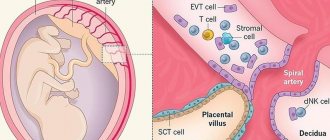Maria Viktorovna Prokhorova, MD, PhD, obstetrician-gynecologist, gynecologist-endocrinologist of the Department of Personalized Medicine MEDSI Premium, told FAN about the features of the 3rd week of pregnancy
A woman who has only recently learned about her interesting situation is always interested in the changes that are happening inside her body. Each pregnancy is unique, as is the expectant mother herself. Nevertheless, the human body develops according to general laws from the moment of fertilization, and doctors know for certain what the baby looks like even in the earliest stages and what metamorphoses will occur in the pregnant woman’s body at one time or another.
First of all, it is worth clarifying that in obstetrics it is customary to consider the gestational age from the 1st day of the last menstruation, and not from the moment of expected conception. The difference between the embryonic and obstetric periods is 2 weeks. Based on these data, experts also calculate the expected date of birth. Most calendars on the Internet on various sites for moms work on the same system. We will also adhere to it, talking about the development of the fetus throughout the 40 weeks of gestation.
Thus, it turns out that the 3rd obstetric week of pregnancy is actually equal to 1 after conception. Maria Prokhorova says that at this time, if a woman wants to be sure that pregnancy has occurred, then the most accurate results will be given by a blood test for hCG (human chorionic gonadotropin) - a special hormone that the body synthesizes while expecting a baby. At week 3, its level should be above 50 mU/ml, however, our expert emphasizes that the indicators depend on the laboratory in which the analysis was taken, since each has its own reference values. Most likely, you will receive the result in the form of a table, which will indicate, among other things, the norm adopted specifically for a specific medical institution. A doctor will finally help dispel doubts.
But Maria Viktorovna does not advise rushing to carry out an ultrasound examination, since at this stage it is not informative enough due to the fact that the embryo is still too small and it is extremely difficult to visualize it. Pregnancy may simply not be visible even with the most sensitive equipment. Be patient and wait a few more weeks, this will save you from unnecessary worries, which are completely unnecessary now.
pixabay.com/
What happens to the fetus?
We have already found out that fertilization of the egg occurs at this time. Moving along the fallopian tube, the mature egg moves to the uterus, leaving the ovary. Sperm penetrate from the uterus into the fallopian tubes, one of them reaches the egg. From the moment the sperm and egg merge, the development of the baby begins.
Its genetic set is the genes of the egg and sperm. The baby's gender, skin, eye and hair color, and other congenital characteristics have already been determined. In 9 months, a unique person will be born, similar to both dad and mom.
How does egg fertilization occur?
Who will be the winner out of hundreds of millions of sperm in the fight for the right to please the egg? That mature reproductive cell of my father’s body, which turned out to be a little more agile, stronger and more desperate than all the others. By our human standards, the speed of movement of the sperm towards its target is small: only from one to two and a half millimeters per minute (although at the moment of the “key shot” the seminal fluid flies out at a speed of 15-20 kilometers per hour!). To move a millimeter, the tail must make about 80 movements from side to side. The movements of a sperm are reminiscent of the movement of a snake: it is the only cell in the human body that is capable of moving on its own!
The egg, having let in the winner, becomes inaccessible to other sperm: the mystery of the formation of a new life begins, and all the energy is devoted only to this process. From two cells - maternal and paternal - 100 billion cells will subsequently develop, and each of them will contain a complete genetic set - about 30 thousand genes.
At the stage of the first five or six divisions, a human being consists of cells, each of which is capable of replacing the other and developing into any organ and any tissue of the body. These are the famous stem cells - the subject of close study in science and ethical battles in society.
What happens in a woman's body?
A cell containing a complete double set of chromosomes is called a zygote. Within 24 hours it begins to divide rapidly. One cell turns into 32 in three days, and by the end of the week this number reaches 250 cells. Now your fruit is called a morula and its size is often compared to a grain of sand, and its shape to a mulberry.
Prenetics is a way to find out the risk of chromosomal abnormalities
already from the 10th obstetric week. Recommended for every pregnant woman. Duration of two days!
More details
Basic rules for this period:
- Don't restrict yourself in food;
- Don't go on diets;
- There should be at least three meals a day (you can eat five times, but in smaller portions);
- Preference should be given to hearty food so that between meals there is no feeling of hunger.
Some foods are considered potentially dangerous, so it is better to exclude them from the earliest possible date. These include:
- Undercooked, undercooked and dried meat - it can retain viable worm larvae;
- Raw seafood. Lovers of sushi and other exotic dishes risk getting food poisoning or becoming infected with helminths;
- Fast food. This food is harmful in itself, and moreover, it is very often prepared in unsanitary conditions;
- Raw eggs. There is a risk of getting salmonellosis;
- Raw milk. From it you can become infected with brucellosis, tuberculosis, salmonellosis, leptospirosis, Staphylococcus aureus and other infections;
- Soft varieties of cheese. Sometimes they are the source of an acute infectious disease - listeriosis. If you are a big fan of this cheese, use it after heat treatment (for example, bake it in some dishes);
- Liver pates in large quantities. Frequent use of this product can lead to an excess of vitamin A in the body, which is dangerous for a pregnant woman;
- Products that contain caffeine (strong black and green tea, coffee). If you drink more than five cups of these drinks a day, you risk premature birth, miscarriage, or low birth weight of the baby. The best option is no more than three cups per day.
What other changes occur in the body of the expectant mother?
As before, the characteristic symptoms of pregnancy in the third obstetric week are invisible, or even completely absent. A woman may not notice any specific sensations during this period. However, the expectant mother’s body is ready to receive a fertilized egg, so there is a possibility that, as two weeks earlier, barely perceptible painful sensations in the lower abdomen and lower back will appear, as well as increased libido.
Already known changes in the mammary glands, their engorgement and increased sensitivity may continue.
It is possible that taste preferences will change towards salty or sweet.
The nature of vaginal discharge changes. Mucus helps protect the egg from external infections.
Ultrasound examination of a woman 3 weeks after IVF
After testing for the level of human chorionic gonadotropin in the blood, a woman can already know that she is carrying a new life within herself. After 3 weeks of pregnancy, what is happening to the fetus can be seen using ultrasound.
At this stage, the embryo is a tiny ball with a barely visible head and tail, surrounded by a fertilized egg. Ultrasound diagnostics in early pregnancy is carried out in two ways:
- Transvaginal, in which a small sensor emitting ultrasound waves is inserted directly into the vagina. It is this procedure that allows you to examine in more detail the condition of the uterus and the fertilized egg in it. To prepare for the scan, no special preparations are required, except for eliminating foods that cause increased gas formation from the diet a few days before the ultrasound, as well as emptying the intestines and bladder immediately before the procedure;
- It is recommended to use the transabdominal method for longer periods. Such an examination does not require any preparation, but is also less detailed due to the greater number of structures in the ultrasound path.
It is ultrasound in the third week after the introduction of embryos that is a method that allows one to reliably determine the presence of pregnancy, since IVF, unfortunately, cannot always guarantee a successful result.
In addition, using ultrasound scanning you can see:
- Number of viable embryos in the uterus;
- Location of the fertilized egg;
- Changes in the ovaries.
The first ultrasound is extremely important to exclude serious pathologies such as ectopic pregnancy, fetal development arrest, determination of multiple pregnancy and the need for further or correction of maintenance therapy.
What should an expectant mother not do at this time?
- Rid yourself of negative emotions and physical activity, spend more time in the fresh air, get proper rest and get enough sleep.
- Do not lift weights, refuse dangerous and tiring sports. Now more than ever you need peace and good mood.
- Completely give up alcohol and cigarettes, even eliminate passive smoking.
- Do not visit places where there is a risk of contracting an infection.
- Avoid X-ray examinations that are risky for the baby, as well as uncontrolled use of medications.
Interpretation of ultrasound during pregnancy
Very often, patients ask GUTA CLINIC gynecologists to decipher the results of ultrasound during pregnancy
.
Let's start with the fact that ultrasound images require direct visual assessment and, being sent by e-mail and then printed, lose a lot in quality, which significantly complicates diagnosis. Ultrasound during pregnancy
is a study performed in real time and requires assessment in real time.
Therefore, interpretation of ultrasound during pregnancy
should be carried out by the specialist who conducted this study for you.
Competent interpretation of ultrasound during pregnancy
requires highly qualified specialists and rich practical experience.
In order to correctly interpret the results of an ultrasound scan during pregnancy
, it is necessary to conduct a study using modern expert equipment by a highly qualified doctor who has undergone appropriate training.
These are the specialists who work at the GUTA CLINIC medical center. Our obstetrician-gynecologists are highly qualified and have extensive experience in performing ultrasound examinations during pregnancy.
.
We use high-quality European equipment, which allows us to perform not only standard ultrasound during pregnancy.
Three-dimensional (3D) ultrasound during pregnancy
3D ultrasound during pregnancy
– three-dimensional, volumetric image of the fetus. Future parents have already appreciated this type of ultrasound examination - often, instead of the first photograph of the baby, a 3D photograph is pasted into the family album.
However, from a medical point of view, the use of 3d
and even
4d ultrasound during pregnancy
, which is more like a film about the intrauterine life of a child, raises doubts.
According to medical indications, 3D ultrasound during pregnancy
is performed only if there is a suspicion of developmental anomalies of the face and limbs.
Approved medications
Separately, we need to talk about medications that the expectant mother is forced to take on an ongoing basis.
- Be sure to consult with your doctor about the possibility of continuing treatment with your chosen medications during pregnancy.
- Be sure to make sure that medications prescribed before pregnancy have no contraindications for taking while pregnant.
Do not prescribe treatment for yourself; take all medications strictly as prescribed by your doctor.
Feelings in the third week of pregnancy
First of all, at this time there is a change in the psycho-emotional state of the woman. This manifests itself in different ways. Some women become very calm, they are satisfied with everything, and a feeling of stability and satisfaction appears. For others, on the contrary, everything falls out of hand, they are irritated, feel constant anxiety, and experience causeless anxiety.
In both cases, the changes are caused by sudden hormonal changes in the body, which is being rebuilt from its normal state to the state of pregnancy.
Emotional changes can be accompanied by physical changes. Due to fluid retention in the body, edema may occur. Also during pregnancy, a decrease or increase in appetite is often noted.
How to prepare for research
We found out at what stage an ultrasound shows pregnancy. Now let's talk about how the expectant mother can prepare for the procedure. Since it is quick and completely safe for mother and baby, preparation will be simple and will not take much time.
- It is advisable to give up foods that contribute to gas formation two days before the examination: legumes, raw vegetables and fruits, dried fruits, dairy products, etc. The accumulation of gases in the intestines will interfere with the procedure.
- Depending on the type of ultrasound examination, the drinking regime may change. Thus, it is forbidden to drink water before a transvaginal ultrasound; the bladder must remain empty during the examination. When performing a transabdominal examination, in some cases it is necessary to drink water: the doctor will warn you about this in advance.
Sex
During the 3rd week of pregnancy, sexual activity is not prohibited. The main condition is mutual desire.
In some women, due to the appearance of symptoms similar to the onset of menstruation, there is a significant decrease in attraction to the opposite sex. In such a situation, you need to talk with the father of your unborn child, explain that this is due to changes taking place within you and does not affect your attitude towards him. Don't force yourself to do something you don't want to do.
Nutrition
Tips on the diet of a young mother
To provide the newly born life with everything necessary, you need to carefully monitor your diet in the 3rd week. Do not overload your body and overeat; it is best to observe moderation.
The diet of the expectant mother should include:
- lean meat and poultry;
- fatty fish;
- dishes made from legumes rich in folic acid;
- a wide range of dairy products: cottage cheese, kefir, yoghurts, cheeses, cottage cheese, etc.;
- vegetables and greens in large quantities;
- fruits;
- berries;
- cereals.
To optimize weight gain, throughout pregnancy it is advisable to exclude white bread from the diet, replacing it with coarse dark varieties. You can find more detailed information about nutrition in the article nutrition during pregnancy.
Vitamins
Essential vitamins in the third week of pregnancy
At the 3rd week of pregnancy (according to obstetric calculations), the expectant mother can and should take vitamin complexes. It is up to your doctor to decide which of the many options is right for you.
All pregnant women are required to take folic acid (vitamin B9) - this is a recommendation that cannot be ignored.
Many gynecologists now recommend a form of methylfolate. It is more easily absorbed by the body.
In many regions, expectant mothers are prescribed to take Iodine and vitamin E. Consult your doctor before taking it.









